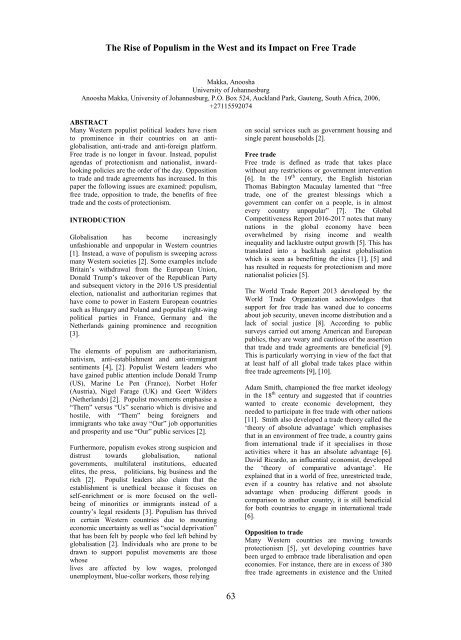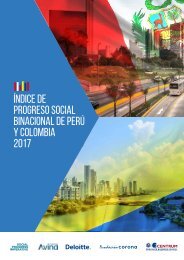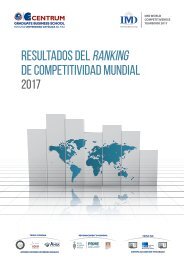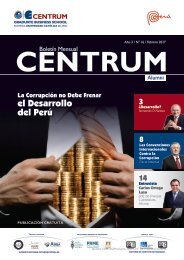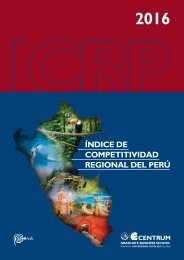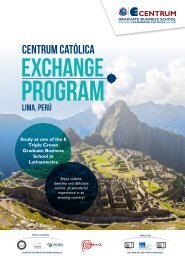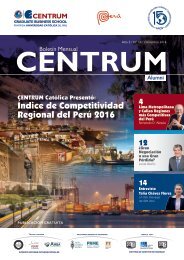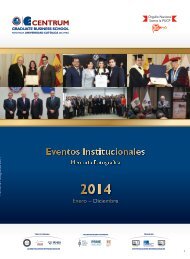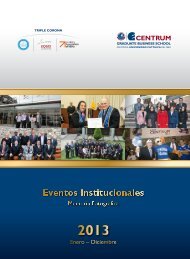Pan-Pacific Conference XXXIV. Designing New Business Models in Developing Economies
This publication represents the Proceedings of the 34th Annual Pan-Pacific Conference being held in Lima, Peru May 29-31, 2017. The Pan-Pacific Conference has served as an important forum for the exchange of ideas and information for promoting understanding and cooperation among the peoples of the world since 1984. Last year, we had a memorable conference in Miri, Malaysia, in cooperation with Curtin University Sarawak, under the theme of “Building a Smart Society through Innovation and Co-creation.” Professor Pauline Ho served as Chair of the Local Organizing Committee, with strong leadership support of Pro Vice-Chancellor Professor Jim Mienczakowski and Dean Jonathan Winterton.
This publication represents the Proceedings of the 34th Annual Pan-Pacific Conference being held in Lima, Peru May 29-31, 2017. The Pan-Pacific Conference has served as an important forum for the exchange of ideas and information for promoting understanding and cooperation among the peoples of the world since 1984. Last year, we had a memorable conference in Miri, Malaysia, in cooperation with Curtin University Sarawak, under the theme of “Building a Smart Society through Innovation and Co-creation.” Professor Pauline Ho served as Chair of the Local Organizing Committee, with strong leadership support of Pro Vice-Chancellor Professor Jim Mienczakowski and Dean Jonathan Winterton.
You also want an ePaper? Increase the reach of your titles
YUMPU automatically turns print PDFs into web optimized ePapers that Google loves.
The Rise of Populism <strong>in</strong> the West and its Impact on Free Trade<br />
Makka, Anoosha<br />
University of Johannesburg<br />
Anoosha Makka, University of Johannesburg, P.O. Box 524, Auckland Park, Gauteng, South Africa, 2006,<br />
+27115592074<br />
ABSTRACT<br />
Many Western populist political leaders have risen<br />
to prom<strong>in</strong>ence <strong>in</strong> their countries on an antiglobalisation,<br />
anti-trade and anti-foreign platform.<br />
Free trade is no longer <strong>in</strong> favour. Instead, populist<br />
agendas of protectionism and nationalist, <strong>in</strong>wardlook<strong>in</strong>g<br />
policies are the order of the day. Opposition<br />
to trade and trade agreements has <strong>in</strong>creased. In this<br />
paper the follow<strong>in</strong>g issues are exam<strong>in</strong>ed: populism,<br />
free trade, opposition to trade, the benefits of free<br />
trade and the costs of protectionism.<br />
INTRODUCTION<br />
Globalisation has become <strong>in</strong>creas<strong>in</strong>gly<br />
unfashionable and unpopular <strong>in</strong> Western countries<br />
[1]. Instead, a wave of populism is sweep<strong>in</strong>g across<br />
many Western societies [2]. Some examples <strong>in</strong>clude<br />
Brita<strong>in</strong>’s withdrawal from the European Union,<br />
Donald Trump’s takeover of the Republican Party<br />
and subsequent victory <strong>in</strong> the 2016 US presidential<br />
election, nationalist and authoritarian regimes that<br />
have come to power <strong>in</strong> Eastern European countries<br />
such as Hungary and Poland and populist right-w<strong>in</strong>g<br />
political parties <strong>in</strong> France, Germany and the<br />
Netherlands ga<strong>in</strong><strong>in</strong>g prom<strong>in</strong>ence and recognition<br />
[3].<br />
The elements of populism are authoritarianism,<br />
nativism, anti-establishment and anti-immigrant<br />
sentiments [4], [2]. Populist Western leaders who<br />
have ga<strong>in</strong>ed public attention <strong>in</strong>clude Donald Trump<br />
(US), Mar<strong>in</strong>e Le Pen (France), Norbet Hofer<br />
(Austria), Nigel Farage (UK) and Geert Wilders<br />
(Netherlands) [2]. Populist movements emphasise a<br />
“Them” versus “Us” scenario which is divisive and<br />
hostile, with “Them” be<strong>in</strong>g foreigners and<br />
immigrants who take away “Our” job opportunities<br />
and prosperity and use “Our” public services [2].<br />
Furthermore, populism evokes strong suspicion and<br />
distrust towards globalisation, national<br />
governments, multilateral <strong>in</strong>stitutions, educated<br />
elites, the press, politicians, big bus<strong>in</strong>ess and the<br />
rich [2]. Populist leaders also claim that the<br />
establishment is unethical because it focuses on<br />
self-enrichment or is more focused on the wellbe<strong>in</strong>g<br />
of m<strong>in</strong>orities or immigrants <strong>in</strong>stead of a<br />
country’s legal residents [3]. Populism has thrived<br />
<strong>in</strong> certa<strong>in</strong> Western countries due to mount<strong>in</strong>g<br />
economic uncerta<strong>in</strong>ty as well as “social deprivation”<br />
that has been felt by people who feel left beh<strong>in</strong>d by<br />
globalisation [2]. Individuals who are prone to be<br />
drawn to support populist movements are those<br />
whose<br />
lives are affected by low wages, prolonged<br />
unemployment, blue-collar workers, those rely<strong>in</strong>g<br />
on social services such as government hous<strong>in</strong>g and<br />
s<strong>in</strong>gle parent households [2].<br />
Free trade<br />
Free trade is def<strong>in</strong>ed as trade that takes place<br />
without any restrictions or government <strong>in</strong>tervention<br />
[6]. In the 19 th century, the English historian<br />
Thomas Bab<strong>in</strong>gton Macaulay lamented that “free<br />
trade, one of the greatest bless<strong>in</strong>gs which a<br />
government can confer on a people, is <strong>in</strong> almost<br />
every country unpopular” [7]. The Global<br />
Competitiveness Report 2016-2017 notes that many<br />
nations <strong>in</strong> the global economy have been<br />
overwhelmed by ris<strong>in</strong>g <strong>in</strong>come and wealth<br />
<strong>in</strong>equality and lacklustre output growth [5]. This has<br />
translated <strong>in</strong>to a backlash aga<strong>in</strong>st globalisation<br />
which is seen as benefitt<strong>in</strong>g the elites [1], [5] and<br />
has resulted <strong>in</strong> requests for protectionism and more<br />
nationalist policies [5].<br />
The World Trade Report 2013 developed by the<br />
World Trade Organization acknowledges that<br />
support for free trade has waned due to concerns<br />
about job security, uneven <strong>in</strong>come distribution and a<br />
lack of social justice [8]. Accord<strong>in</strong>g to public<br />
surveys carried out among American and European<br />
publics, they are weary and cautious of the assertion<br />
that trade and trade agreements are beneficial [9].<br />
This is particularly worry<strong>in</strong>g <strong>in</strong> view of the fact that<br />
at least half of all global trade takes place with<strong>in</strong><br />
free trade agreements [9], [10].<br />
Adam Smith, championed the free market ideology<br />
<strong>in</strong> the 18 th century and suggested that if countries<br />
wanted to create economic development, they<br />
needed to participate <strong>in</strong> free trade with other nations<br />
[11]. Smith also developed a trade theory called the<br />
‘theory of absolute advantage’ which emphasises<br />
that <strong>in</strong> an environment of free trade, a country ga<strong>in</strong>s<br />
from <strong>in</strong>ternational trade if it specialises <strong>in</strong> those<br />
activities where it has an absolute advantage [6].<br />
David Ricardo, an <strong>in</strong>fluential economist, developed<br />
the ‘theory of comparative advantage’. He<br />
expla<strong>in</strong>ed that <strong>in</strong> a world of free, unrestricted trade,<br />
even if a country has relative and not absolute<br />
advantage when produc<strong>in</strong>g different goods <strong>in</strong><br />
comparison to another country, it is still beneficial<br />
for both countries to engage <strong>in</strong> <strong>in</strong>ternational trade<br />
[6].<br />
Opposition to trade<br />
Many Western countries are mov<strong>in</strong>g towards<br />
protectionism [5], yet develop<strong>in</strong>g countries have<br />
been urged to embrace trade liberalisation and open<br />
economies. For <strong>in</strong>stance, there are <strong>in</strong> excess of 380<br />
free trade agreements <strong>in</strong> existence and the United<br />
63


